The Flamboyant Songbird Speaks
Rafi: I am immensely pleased to have our very beloved, OUR Mitali Mukherjee with us today. I am a fan of yours and even on the way to office, I have been humming your tunes, especially Bhule Gecho Shanto. How are you today?
Mitali: I truly sense the affection and closeness when you call me OUR Mitali. I feel absolutely elated to be at my birthplace, my soil, my homeland. The emotion is unique and indescribable! I am doing very well today. And the song you mentioned Bhule Gecho Shanto is also one of my favorite songs.
Rafi: It's a beautiful song. Who was the composer?
Mitali: It was composed by Alauddin Ali. Keno Asha Bedhe Rakhi was my melody and written by my younger brother Pradip Mukherjee. There is a story behind this song. My elder brother Deepak was the main support behind my musical career. He encouraged me greatly and made me listen to all the prominent artistes. I was handed this project after he passed away in 1988. Which is why I would say the melody came from the depth of my loss. And many came to me personally saying that they could feel the pain and anyone who has lost a loved one can connect to the song.
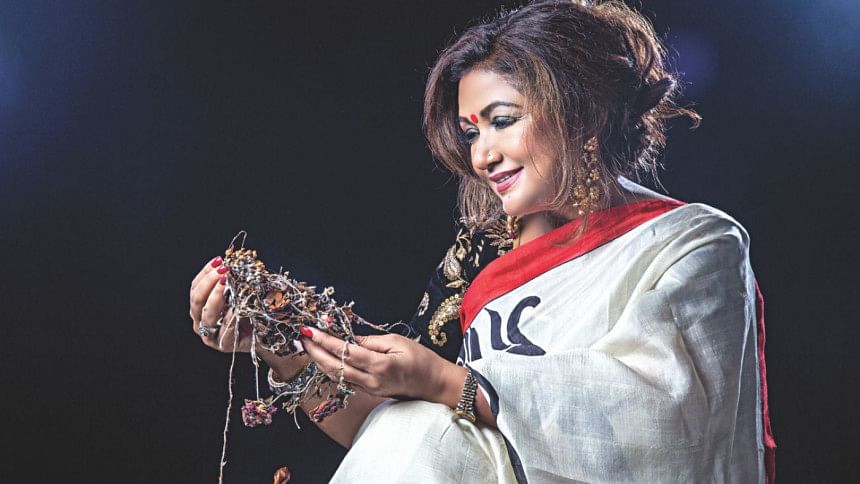
Rafi: Did you compose any other song, apart from Keno Asha Bedhe Rakhi?
Mitali: Yes, I have composed a few Ghazals. I have also sung a few Gujarati and Tamil songs. I have recorded a few Bangla songs recently, done halfway through. I plan to release them soon when they are ready. Everyone around me tells me to release them soon and be more spontaneous but I am a perfectionist; I feel I still have a few changes to make in terms of the lyrics, tune and music. I hope you will get to hear them soon.
Rafi: You have been in the music industry for a while now. Do you find any difference between the Indian and Bangladeshi music industry?
Mitali: Being a Bengali girl from Mymensingh and coming from a culturally rich family where I practiced Nazrul Geeti and Rabindra Sangeet, the journey towards music was paved easily. However, when I first started to learn Gujarati, I stumbled in the theoretical part because it was completely new to me. I could speak and understand Hindi but writing was a challenge for me. My teacher greatly motivated me and ultimately I took the challenge positively. Hindi words are similar to Sanskrit, which is why I could relate to them. My range of expertise in multiple languages grew when I started to learn Urdu for Ghazals. The intonation of few words is different in Urdu and step by step I learned from different eminent personalities to enhance my linguistic skills. This became my foundation as an artiste in India. I believe folk, Sufism and Lalon, Bulleh Shaha, Baba Farid – all of them share the same philosophy and roots, only the language is different. So the only difference working in the Indian subcontinent for me is the language and as I can sing in multiple languages, my audiences can connect to my performances easily.
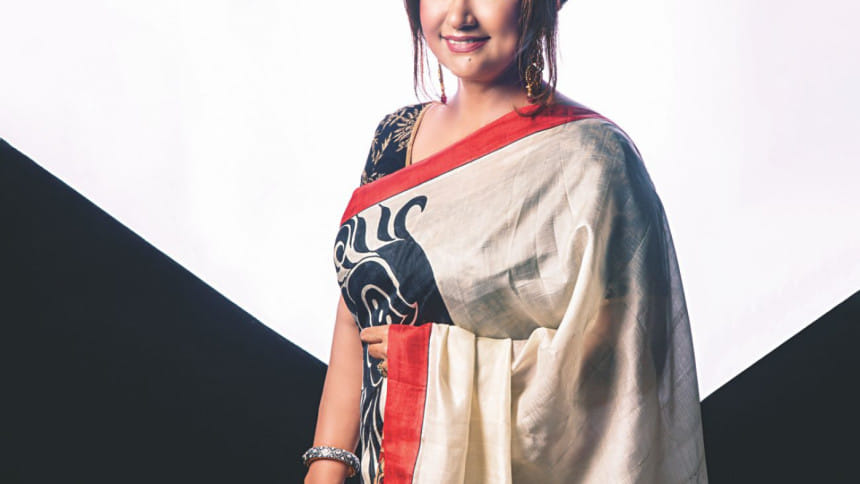
Rafi: What suggestion would you give to the aspiring musicians of today who want to go abroad to learn music?
Mitali: The main objective should be the desire for learning rather than mere stardom. I always followed singers like Runa Apa, Sabina Apa, Lata Mangeshkar and had the longing to just reach the correct note they are singing at. The new generation should embrace humility and their sole focus should be on learning. They should also choose reputed music institutes to learn music, like ICCR in Kolkata, Baroda, or Delhi. The youngsters should also cultivate the habit of reading: literature in general, poetry in specific. The works of Rabindranath, Nazrul, Shamsur Rahman, Humayun Ahmed, Helal Hafiz are thought provoking and teach you a lot about life. I have one blue and one green notebook where I note every quote or excerpt of poems that I like.
Rafi: Interesting. Tell us more about your notebooks?
Mitali: My blue notebook is filled now; I have a green notebook where I wrote a saying of Rabindranath, which I really like, "Shimul kaath e hok ba Bokul kaath, Jokhon jole agun chehara ta ek". So I always write anything noteworthy in my notebooks.
Rafi: You have a desire to establish a classical music academy in Bangladesh. Tell us more about your plan.
Mitali: When I was the judge of the Sa Re Ga Ma Pa musical contest, many aspiring musicians from Bangladesh sent request letters to participate in the contest. Gajendra Singh, the director of the show, mentioned to me that everyone in Bangladesh is folk based. He also asked me about the practice of classical music in Bangladesh. This hit me hard. Every time I come here, I feel the absence of an academy or institute focusing on classical music. Bangladesh does have a classical fest and similar events. I believe workshops conducted by prominent persons can help a lot in enhancing the skills of the singers. Sometimes talking and exchanging knowledge can contribute significantly in the overall development of a skill. Thus I dream that a Bangladeshi young singer will someday do the opening performance in a classical fest.
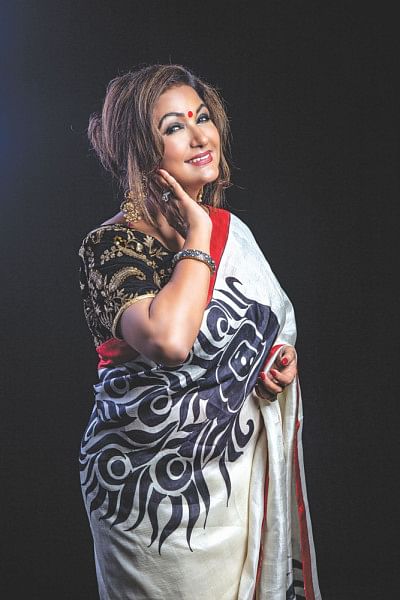
Rafi: After your marriage you became a part of India as well and gained more recognition there. Do you miss your motherland?
Mitali: The feeling is beyond description and words. Once in Sa Re Ga Ma Pa a Bangladeshi girl was singing. I felt very emotional when I heard her sing. My base as singer was formed in my motherland, and only when I got a scholarship from India that I left for higher education. I was the younger daughter, so my father never wanted me to go to Baroda to study. However, my elder sister and brother Deepak convinced him and encouraged me to take a step forward. So, I went to Baroda with one of my friends called Nasrin, who also got a scholarship. During our journey to Baroda, we could see the geographical changes, from rivers and greenery to dry land. Once in our campus we were shown Pather Panchali by Satyajit Ray, I cried so much that day and I related myself to the characters. I missed Bangladesh so much that I used to visit my family every summer during vacation. Whenever I reached Dhaka my father used to wait for me with a car and then we went to Mymensingh together. So even now I feel the same when I come to Dhaka.
Rafi: Now-a-days singing has gone to another level due to technological advancements and even the Bangla music industry has adopted the new style. How did this affect the Indian music industry?
Mitali: It's the same in India. The harsh reality is that due to technological advancements now everyone is a singer. A young singer who is practicing 8-9 hours is not getting the exposure, whereas a person with money and capability to make a music video is reaching stardom. Kalyanji–Anandji once told me, "Songs are like newspapers, read it once and throw it away but only a few old prominent songs are like Bible and Bhagavad Gita which will remain eternally". So we still have a few songs that have timeless value.
Rafi: Name a few singers from India, who according to you, are performing well.
Mitali: I think Shreya Ghoshal is doing very well. Sadly however, there are few other singers who are following her style and imitating her voice, so it kind of becomes repetitive. Neeti Mohan is also another uprising talent, she has a unique voice. Arijit Singh has a mesmerizing voice and he is a worthy talent.
Rafi: Are you also singing in movies?
Mitali: No. Actually I did only a few songs for movies. My father was very strict and reserved; he told me to focus more on my PhD and never stay outside late. I was always very scared of him and thus followed his advice.
Rafi: Does Ghazal have a different audience?
Mitali: Yes, it is mainly poetry with tune, so rather than writing many words in a letter you can express your thoughts through few lines of a Ghazal.
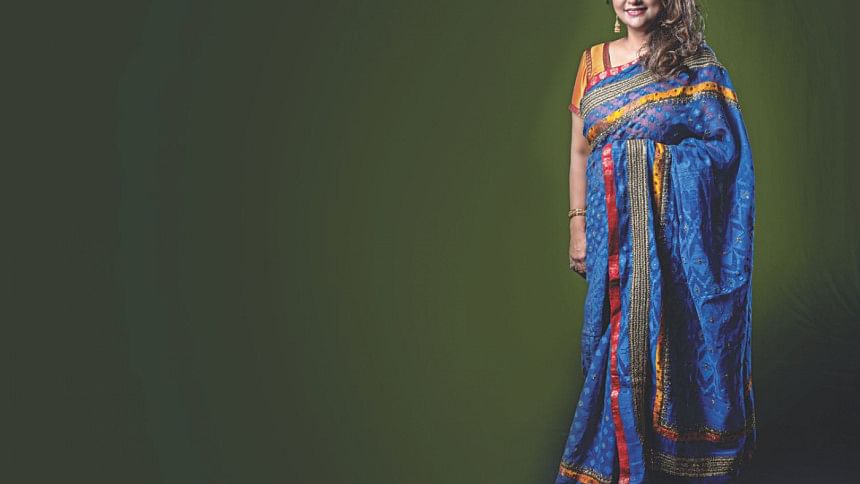
Rafi: Could you, in simple words, tell our readers the difference between Thumri and Ghazals?
Mitali: Thumri is characterized by its sensuality, and by a greater flexibility with the raga and rhythm. Thumri is also used as a generic name for some other, even lighter, forms such as Dadra, like, "Jiya mora na lage beiri balam". The Ghazal is a form of amatory poem or ode. A Ghazal is composed of couplets, five or more. The couplets may have nothing to do with one another except for the formal unity derived from a strict rhyme and rhythm pattern. It is very hard to form Ghazals in Bangla because of limited Radif (the second line of all the couplets must end with the same words) and Qaafiya (a repeating pattern of words).
Rafi: Is it possible to compose Ghazals in Bangla if someone follows the rules?
Mitali: The poet must do a lot of research. Srijato Bandopadhyay, a young poet is writing Ghazals in Bangla, but I am not sure how much the Radif and Qaafiya is being maintained. He has sent me samples; I have to take a look at them before I can comment on his works.
Rafi: Did you think about writing in Bangla?
Mitali: I find it very difficult. I find limitations in maintaining the grammar; however those who actually write might succeed, if they do their research properly.
Rafi: Why do think nobody tried to compose Ghazals in Bangla before?
Mitali: Many did compose Ghazals in Bangla, but I am not aware if the Radif and Qaafiya were sustained. I have to listen to them. Another form is the Nazm, normally written in rhymed verse and also in modern prose style poems, like one that I and Gulzar sir sang, Kitni Girhein Kholi Hain Kitni Girhein Ab Baqi. The entire poem was written on womanhood.
Rafi: The duo of Jagjit Singh and Chitra Singh has mesmerized the audiences over decades. You and Bhupinder Singh are a successful Ghazal couple as well. Do you think audiences prefer more couples or single artistes for Ghazals?
Mitali: This is an interesting perspective. I never thought of it this way. My first Ghazal was actually done solo.
Rafi: Did you plan on focusing on Ghazals right at the beginning of your career?
Mitali: No. It just happened with time and the preference of the audiences. When I used to sing Nazrul or Folk music, I found it hard to make my audience connect to my songs, but when I started singing Ghazals there was an instant spark. Everyone appreciated me and slowly I matured as a Ghazal singer. And the couple tradition that you mentioned was not made to happen intentionally. My husband was always busy in movies and he is not only an excellent singer but also a superb guitarist. He played in many R. D. Burman productions. After our marriage we were offered to sing together and the audience accepted us.

Rafi: After your marriage how did you adapt to the cultural change?
Mitali: The cultural change did not happen after marriage. I had to adapt to the new culture when I went to study in Baroda. Before even meeting my husband Bhupinder Singh, I was his fan. My brother once bought one of his songs and told me to hear his voice; it truly mesmerized me. I never thought he would be my husband. I was in Baroda when he first heard me. I sang a song of Lata Mangeshkar, where I pronounced the word 'bazaar' differently. He corrected me and also taught me Gujarati. So the cultural change was mainly the language for me and I adapted to it gradually with time.
Rafi: Tell us about your love story.
Mitali: It is a long story. I went to watch a movie. It was called Parichay; the movie had a few of my husband's songs. I was already his fan, but when I heard the voice in the movie, I felt the need to meet him. My warden was a very loving person and she took me to visit her house in Bombay, as I had never been there. She organized a get-together where I sang in front of actor Ashok Kumar, a few prominent Gujarati singers and a Doordarshan director. After hearing my voice the Doordarshan director offered to record a song the day after, and we agreed. My warden took me to the studio. I recorded three songs and came back to Baroda. One day, the guard comes up to me and tells me that someone from Bombay came to visit me. So I went to see who it was. I saw a nice gentleman in satin clothes. His name was Shashi Kumar. He told me that I sing very well and he was sent by Bhupinder Singh. I was excited to hear that; however I did not like the attitude of Shashi Kumar. Next time I went to Bombay, it was to sing in the Filmfare Awards; Ashok Kumar Ji suggested my name. I met my husband during the rehearsals. We also met in a studio where my warden took me and there he asked me, why I did not call him. My friends used to tease me because I had a certain liking for him. Gradually we met in different places, our attachment grew strong, he appreciated my singing and we both had admiration for each other's voices. And through music our love story began.
Rafi: When did you get married?
Mitali: We got married in 1983. He came to Baroda for a program and when I saw that he was serious about me, we decided to get married.
Rafi: What do have to say for the new talents recognized through musical contests in India and Bangladesh?
Mitali: When I came to Channel-i Shera Kontho after many years, I had seen growth in the younger generations. They were singing very well and they had knowledge about whatever they were singing. Now the only thing necessary is proper grooming. I am not against this but in Bangladesh I feel they should step out of the box and bring variation in their singing. When I was in Sa Re Ga Ma Pa, the participants sang a variety of songs. So I would say the scope and exposure in India is wider compared to Bangladesh. Thus we need an academy in Bangladesh to give the aspiring singers the appropriate exposure and grooming.
Rafi: Why do think music contest winners often vanish after a brief success?
Mitali: I believe the parents have a big role to play in this. They think that winning is everything, but even if you do not win you should continue singing. My family always kept me grounded and my music teacher told my parents not to allow me to do shows outside till my 10th grade. I was allowed to take part in competitions but no playbacks, so I was always dedicated to singing because of my family.
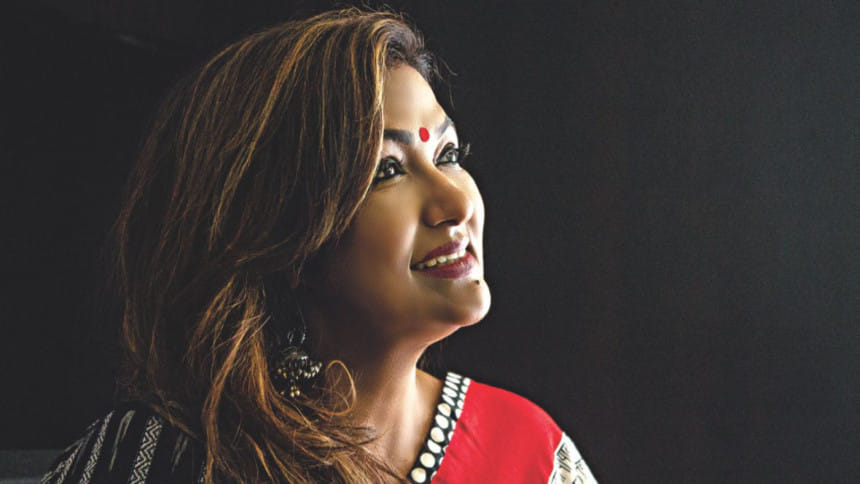
Rafi: Tell us about the music directors whose songs you have sung most?
Mitali: Alauddin Ali and Anup Bhattacharya have composed most of the songs I have sung. I have also sung a few songs composed by Sheikh Sadi Khan.
Rafi: What do you think is the biggest achievement in your career?
Mitali: The National Film Award in Bangladesh in 1982 for the song Ei Dunia Ekhon to Ar for the film Dui Poishar Alta.
Rafi: Which of your songs do you like most?
Mitali: It is very difficult to answer, but if I have to then I would say Harano diner moton hariye gecho tumi.
Rafi: What tips do you have for singers to improve their voice?
Mitali: Besides practicing, one must listen to a variety of songs and also they must do yoga. Yoga will help them to control the breathing system, to open up their voice and be stress-free. They must also eat healthy and sleep timely. The one thing that comes above all is gratefulness. We should always be thankful to the Almighty for whatever we have rather than taking things for granted.
Rafi: Any message for your audience?
Mitali: Our audience keeps us alive. We have so many artistes, channels and shows now-a-days, but reaching the soul of music is what is crucial. Please do write to me through Star Showbiz if you want me and Bhupinder Singh to perform in Dhaka. I hope to bring forward more new songs in the future. Just as we are making music; listening to them and keeping them alive is your responsibility.






Comments